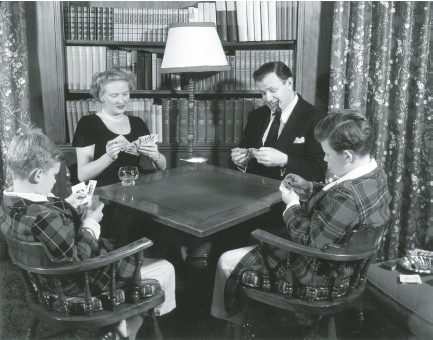My Life as a Mankiewicz (30 page)
Read My Life as a Mankiewicz Online
Authors: Tom Mankiewicz

The director was George Cosmatos, who would later direct
Rambo.
George smoked four packs a day. This picture was his whole life. They had signed Sophia Loren, Richard Harris, Ava Gardner, and Burt Lancaster. Sophia said, “We want top writers here. This script isn't right.” So they gave her a list, and she said, “Tom Mankiewicz. He was here ten years ago. Get him, I love him.”
I received a cable I still have from Carlo Ponti saying, “Sophia and I are wondering, could you come over for a few weeks and do some work?”
I said, “Absolutely. Why don't I send you pages right now, because I'm producing a picture”â
Mother, Jugs & Speed.
“I will also call Burt Lancaster, who's in L.A.”
Although he's only in the first twenty minutes of the movie, Burt hated his part. I'd written some pages and sent them to his agent. My assistant very breathlessly came into my office and said, “Burt Lancaster's on the phone!”
I was almost as impressed as she was. I'd grown up with
Trapeze, Brute Force, Elmer Gantry
, and
From Here to Eternity.
I mean, he's Burt Lancaster. I got on the phone. He talked just like Burt Lancaster. “These pages are good, kid. They're very good. Much better. I have a few suggestions.”
I said, “Please, anything.”
“Could I stop by your office at Fox?”
“Absolutely, any time.”
“Say about ten in the morning.”
“I could come down to you.”
He said, “No, no, I'll be in town. I'll come to you. Ten o'clock. Oh, and Tom, don't forget to leave a pass at the gate.” I thought, God, Burt Lancaster driving up to any studio, you don't need a pass; you're fucking Burt Lancaster!
So he arrived the next morning for our meeting. And he was wonderful. He said, “I'm going off to Europe now, but you'll send the pages to me.”
I said, “Absolutely.”
He said, “It's very nice to meet you.”
I said, “Could you do me a favor before you leave?”
“What is that?”
“Some people today are being brought up on Dustin Hoffman and Robert Redford, but I was brought up on Burt Lancaster and Kirk Douglas. Before you leave, could you just laugh for me?”
He said, “You mean like ha, ha, ha?” And he went, “Ha, ha, ha, ha, ha,” like in his movies, and I started laughing. He went louder, “Ha, ha, ha, ha, ha, ha!” And he backed out of my office going, “Ha, ha, ha, ha!” It was just wonderful. I was in hysterics. The only time I ever met him. I don't care whether my father was in the movies or not, when you run into one of your heroes, it elicits the same reaction every time like when I was seventeen and turned around and there was John Wayne. You're a movie fan. I was so thrilled to be in the same room with Burt Lancaster. If he had said about the script, “No, here I think I should rape five people,” I would have said, “Yeah, good idea, good idea!” because I'm with Burt Lancaster.
So during
Mother, Jugs & Speed
, over six or seven weeks, I did some work on the
Cassandra
script. It had an all-star cast: Ingrid Thulin, who was one of Ingmar Bergman's leading ladies; Ava Gardner, who'd done
The Barefoot Contessa
for my father; Lionel Stander, who was a blacklisted actor at the time and later wound up playing Max for me in
Hart to Hart;
and the first part for O.J. Simpson. This is how silly the movie was, O.J. Simpson played a priest. George Cosmatos was so thrilled. He said, “I got O.J. Simpson.” Richard Harris was the male lead (they wanted Peter O'Toole, who sensibly turned it down), and Sophia. I never visited the set. I was never in Europe. I just kept sending pages, and then I would get notes and I'd get on the phone with Sophia. I was getting a nice piece of change for this. Carlo Ponti called me and said, “Listen, tell your agent to make the deal for half the amount of money. And I'll put the other half in a Swiss bank for you, and no one will know about it. Tax free. Be drawing interest for the rest of your life.”
I said, “Jesus, Carlo, that's illegal, isn't it?”
I've often thought that if I'd put that money in a Swiss bank, which would now be over thirty-five years agoâand it was a nice chunk of moneyâwhat it might be worth today. But then, you have to go get it. That's how a lot of business was done on European films. It was a huge hit in Europe. Mario Kassar and Andy Vajna made a pile off it. It was toward the end of the disaster cycle. Everybody had destroyed everything.
The Eagle Has Landed
The Eagle Has Landed
was a big bestseller by Jack Higgins. It was going to be a Paramount movie. Lew Grade was the executive producer. It was produced by a guy named Jack Wiener, very bright, smart, and British. His partner was David Niven Jr., who's the most charming guy in the world but knows absolutely nothing about producing movies. He was just hanging on. And I did the screenplay. I was so excited because they got John Sturges to direct it.
Bad Day at Black Rock. The Magnificent Seven. The Great Escape.
I met with him. He had a patch over one eye. A tough old guy. He liked the script a lot. It was about a plot to kidnap Churchill in World War II. The best part was the undercover IRA agent, which Donald Sutherland played. We offered that part to Michael Caine. Michael called me and said, “Listen, I love the script. I'd like to be in this movie.” He said, “I'm forty-two years old. I had my first child only four years ago. I'm happily married. I don't want to play an IRA agent. There are so many crazy people, and if they think I'm playing it wrong or somebody takes offence⦔
I said, “It was in the Second World War.”
He said, “But still, it's the IRA. On the other hand, I'd love to play the German colonel.”
I said, “I'm sure we'd love for you to do it. Let me talk to John Sturges.”
Michael said, “Isn't it amazing? Here we are only thirty years after the Second World War, and a British actor would rather play a Nazi colonel than an Irishman.”
So he played the colonel. Donald Sutherland said, “What are they going to do to me? I'm fuckin' Canadian!” So Donald played the IRA agent.
There were some wonderful actors: Robert Duvall; Judy Geeson; that terrific woman from
Upstairs, Downstairs
, Jean Marsh; Larry Hagman. It was, in many ways, easily the best script I'd ever written. But John Sturges, for some reason, had given up. Michael said on the set, sometimes, if he was behind, he would say, “We don't have to shoot that scene.” This was a heartbreak for me. It's my cousin Ben Mankiewicz's favorite movie, and it gets a great review in Leonard Maltin's book, another
Mother, Jugs & Speed.
My new favorite critic. But there were scenes missing. I wasn't there for most of the shooting. I was just there for the beginning, and everything was fine and everybody was happy. Donald and Michael were wonderful. But when it was over, John Sturges didn't even edit it. He got on a boat and went to the Mediterranean.
The picture is as good as it is because Anne V. Coates was our editor. She edited
Lawrence of Arabia
. She was David Lean's editor. I didn't know her. She was screening a rough cut for some executives in a big theater. I was invited. Rough cuts are always difficult. Francis Coppola said, “No movie is ever as good as the rushes or as bad as the rough cut.” You watch the rushes every day and say, “Boy, we nailed that. They're gonna love that.” Then, you put the whole film together and you say, “Oh, boy, are we in trouble.” Every time. I sat there, and I was frankly a little disappointed. Some of my favorite scenes or little moments weren't even there. The executives liked it a lot.
Anne Coates came over to me and introduced herself. “You're Tom Mankiewicz, right?”
I said, “Yes.”
She said, “Are you terribly disappointed?”
“Just a little.”
“I thought you would be. I read your script.”
She said some of it was unexplainable. In the picture, Michael goes around recruiting with a letter from Hitler authorizing him to do whatever he wants in terms of getting into England. There's a scene with Donald Pleasence, who plays Himmler, where Michael finds out that the letter he's been carrying is a fake. Hitler knows nothing about it. You've got to cut to Michael's face when he finds out. There was no close-up of him. I said to Anne, “You've got to cut to his close-up.”
She said, “There isn't one.”
I said, “That's impossible.”
She said, “There isn't one.”
Sturges never directed again. Some of the actors told me he was drinking very heavily on the movie and would sometimes come in in the morning hung over, and then he would start to drink in the afternoon. I don't mean to vilify him in any way, because he's one of my heroes as a director. I was so thrilled he was going to be on it. But he never directed again. That was his last movie. He took off on a boat, and Anne Coates said that's the last she saw of him. He just gave up.
But the actors were so good. John Standing, who played a priest in the film, said, “You know the thing about Michael Caine? We were all in that church in the movie, and there's all of these wonderful actors, and we're all acting up a storm. And Michael Caine is doing nothing. I'm thinking, poor sod. I watched the rushes the next day, and he's doing everything. He knows how to act on film. He doesn't overact, he just listens.”
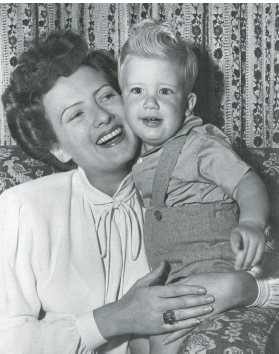
Rosa Stradner (mother) and Tom Mankiewicz (age one year), Los Angeles, 1943
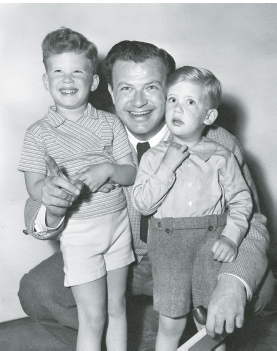
Chris Mankiewicz (brother), Joe Mankiewicz (father), and Tom Mankiewicz (age two years) at home in Los Angeles, 1944
Unless otherwise noted, photos are from the collection of Tom Mankiewicz
.
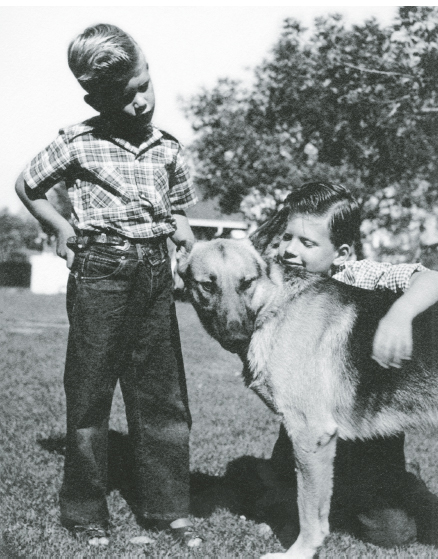
Tom, Timber, and Chris at home in Los Angeles, 1940s
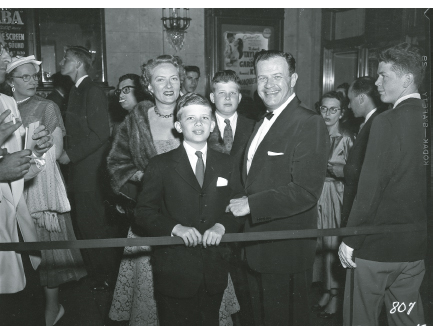
Rosa, Tom, Chris, and Joe, movie premiere, New York City, 1953
